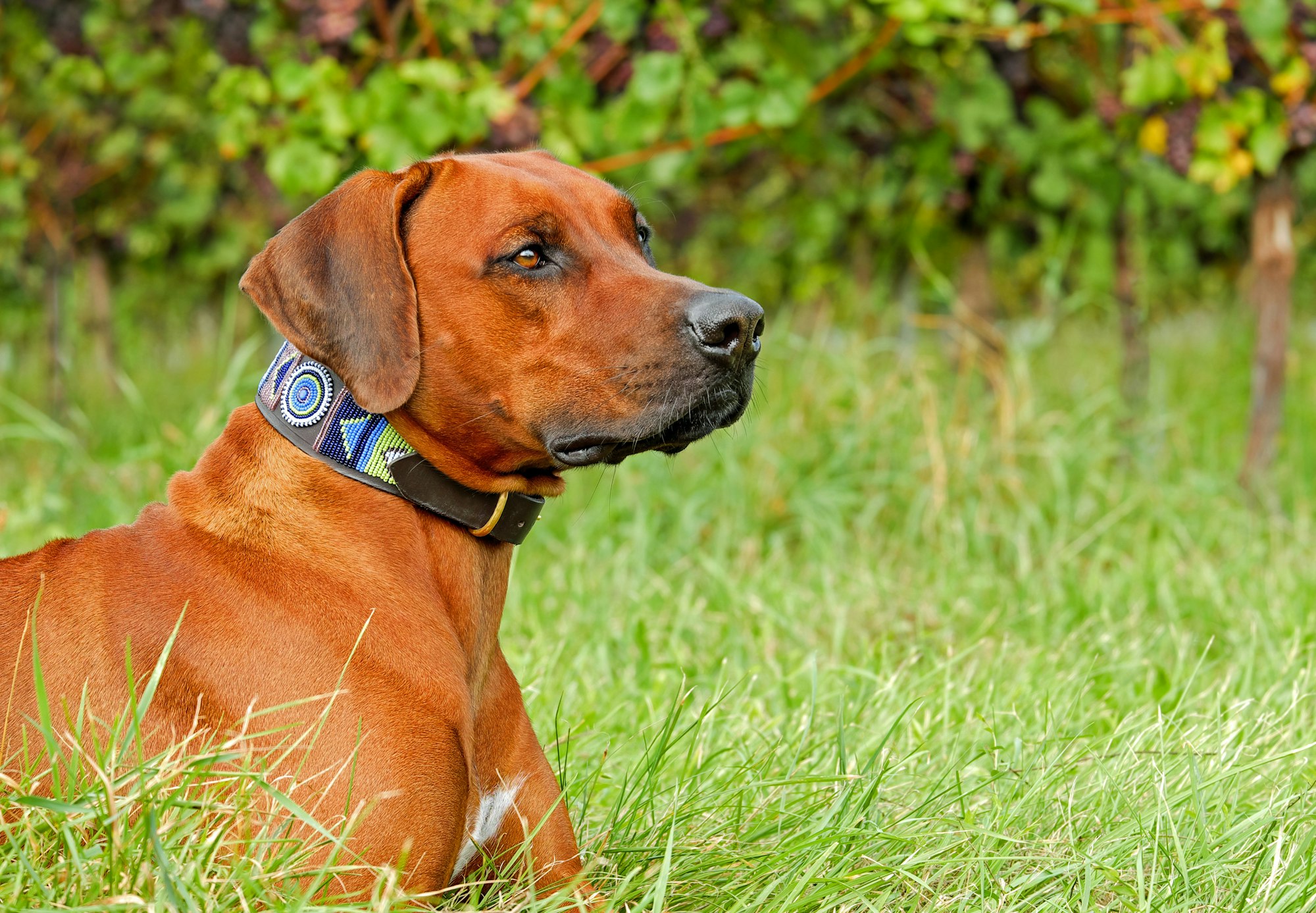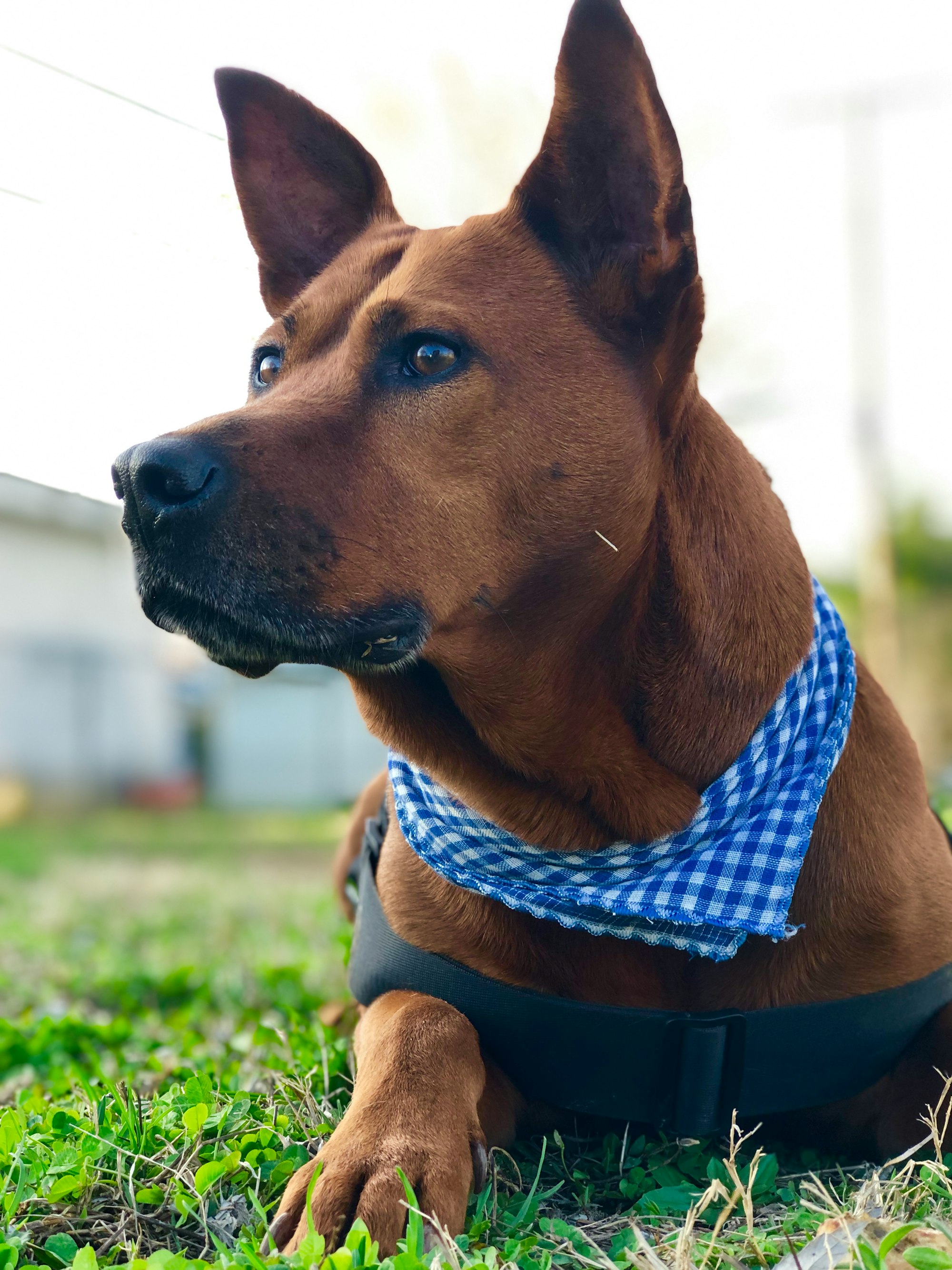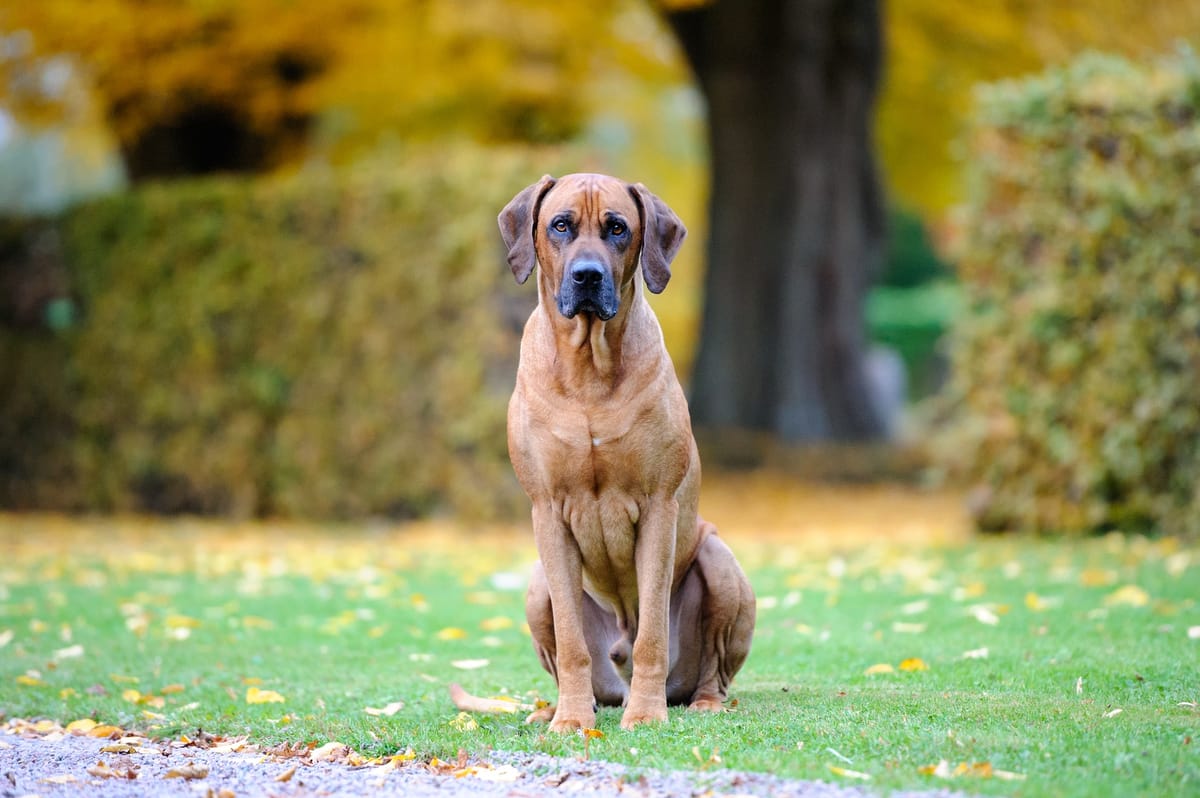When it comes to exceptional companionship and remarkable canine qualities, the Rhodesian Ridgeback stands out as an extraordinary breed. Originally bred in southern Africa, this breed possesses unique characteristics that make it a favorite among dog enthusiasts worldwide. In this article, we'll delve into the captivating world of the Rhodesian Ridgeback, exploring its history, distinct physical features, temperament, training needs, and more.

A Glimpse into History
The Rhodesian Ridgeback, also known as the "African Lion Hound," traces its roots back to southern Africa. Bred by the indigenous Khoikhoi people and European settlers, this breed was developed to be a versatile hunting and guarding companion. Their distinct ridge of hair along the spine, growing in the opposite direction to the rest of the coat, sets them apart and has captured the curiosity of dog enthusiasts worldwide.
Remarkable Physical Attributes
Distinctive Ridge: One of the most striking features of the Rhodesian Ridgeback is the distinctive ridge of hair that runs along its back. This unique feature has earned them their name and is a testament to their African heritage.
Muscular Build: Rhodesian Ridgebacks boast a muscular and well-proportioned body, making them excellent athletes. Their strength and agility make them capable companions for various activities, from jogging to hiking.
Glistening Coat: Their short and sleek coat not only adds to their aesthetic appeal but also makes them well-suited to warmer climates. Their coat comes in various colors, including light wheaten to red wheaten, providing a range of beautiful appearances.
Weight and Height: Rhodesian Ridgebacks typically exhibit a well-muscled and athletic build, reflecting their heritage as versatile hunting companions. The ideal weight for a male Rhodesian Ridgeback usually falls between 85 to 90 pounds (38.5 to 40.8 kilograms). Female Rhodesian Ridgebacks, being slightly smaller, generally weigh around 70 to 75 pounds (31.8 to 34 kilograms). It's important to note that these figures are approximate and can vary based on individual genetics, activity level, and overall health.
Eye Color: Rhodesian Ridgebacks can showcase a range of eye colors, each contributing to their unique and arresting presence. The most common eye colors found in this breed include:
- Dark Brown Eyes: Dark brown is a prevalent eye color in Rhodesian Ridgebacks. The depth of this color adds a warm and soulful quality to their gaze, often reflecting their loyal and affectionate nature.
- Amber Eyes: Amber eyes are also frequently observed in this breed. These golden-hued eyes exude a sense of intelligence and curiosity, capturing the essence of the breed's inquisitive spirit.
Genetic Influences
The inheritance of eye color in Rhodesian Ridgebacks, as in many other dog breeds, is influenced by genetics. The interplay of genes inherited from their parents determines the eye color that a Rhodesian Ridgeback will develop. While dark brown and amber are the most common eye colors, variations can occur based on individual genetic makeup.
Temperament and Personality
Loyal and Affectionate: Rhodesian Ridgebacks are known for their unwavering loyalty and deep affection for their human families. They often form strong bonds and thrive on companionship.
Independent Thinkers: While being loyal, these dogs also possess an independent streak. They are capable of making decisions and can be quite self-reliant.
Guardians with a Gentle Side: Despite their impressive guarding instincts, Rhodesian Ridgebacks are often gentle giants with a soft spot for children. Their protective nature makes them excellent family dogs.
Do Rhodesian Ridgebacks Like to Cuddle?
Rhodesian Ridgebacks can be affectionate and enjoy cuddling with their family members, but their independent and sometimes aloof nature means they may not be as cuddly as some other breeds. These dogs form strong bonds with their owners and often enjoy being close, but they also value their personal space and can be more reserved. Each dog has its own personality, so while some Rhodesian Ridgebacks may love to snuggle, others might prefer showing their affection in different ways, such as by being nearby or following their owners around the house. Proper socialization and understanding of their individual preferences can help foster a close and loving relationship.

Training and Socialization
Training and socialization are essential pillars in raising a well-rounded and well-behaved Rhodesian Ridgeback. As a breed known for its loyalty, intelligence, and protective nature, proper training and socialization contribute to a harmonious and fulfilling relationship between you and your four-legged companion.
In this section, we'll explore the importance of training and socialization for Rhodesian Ridgebacks and provide valuable insights into fostering their best qualities.
The Foundations of Training
Start Early: Begin training your Rhodesian Ridgeback puppy as soon as you bring them home. Early training establishes a strong foundation for obedience and positive behavior.
Positive Reinforcement: Rhodesian Ridgebacks respond exceptionally well to positive reinforcement techniques. Use treats, praise, and rewards to encourage desired behaviors and commands.
Consistency is Key: Consistency in commands and expectations is vital. Use clear and distinct cues for different commands to avoid confusion.
Patience and Persistence: Training takes time and patience. Be persistent and avoid becoming frustrated if progress seems slow.
Can You Use Rhodesian Ridgebacks to Hunt?
Yes, Rhodesian Ridgebacks can be used for hunting. Originally bred in Southern Africa, they were developed to track and hunt large game, including lions, which earned them the nickname "African Lion Hound." Ridgebacks are known for their strength, endurance, and bravery, making them well-suited for hunting various types of game. Their keen sense of smell and ability to track scents over long distances make them excellent hunting companions. While they may not be used for hunting lions today, they can still be effective in hunting smaller game and tracking animals in diverse terrains. Proper training and conditioning are essential to harness their natural hunting abilities.
Socialization for Confidence
Exposure to Various Environments: Introduce your Rhodesian Ridgeback to different environments, people, animals, and situations. This helps them become confident and adaptable.
Puppy Playdates: Arrange playdates with other well-mannered dogs to teach your Rhodesian Ridgeback proper canine interactions.
Positive Experiences: Ensure that interactions are positive and not overwhelming. Gradually expose your dog to new experiences, rewarding calm and confident behavior.
Addressing Specific Training Needs
Leash Training: Due to their hunting heritage, Rhodesian Ridgebacks may tend to pull on the leash. Use positive reinforcement and consistent training to teach loose-leash walking.
Basic Commands: Teach essential commands such as sit, stay, come, and down. These commands not only enhance control but also foster a strong bond between you and your dog.
Guarding Instincts: While their guarding instincts are commendable, proper training is necessary to prevent overprotective behavior. Teach them to differentiate between normal visitors and potential threats.
Are Rhodesian Ridgebacks Good with Cats?
Rhodesian Ridgebacks can be good with cats, but it depends on the individual dog's temperament, socialization, and training. As a breed originally developed for hunting, they may have a strong prey drive, which can lead to chasing behaviors. Early and positive introductions between a Rhodesian Ridgeback and a cat are crucial for fostering a harmonious relationship. With proper socialization and training, many Ridgebacks can learn to live peacefully with cats. It's important to supervise initial interactions and be patient, allowing both animals to adjust to each other gradually.
Mental Stimulation and Physical Activity
Engage Their Minds: Rhodesian Ridgebacks are intelligent dogs that thrive on mental challenges. Puzzle toys, interactive games, and obedience training keep their minds sharp.
Regular Exercise: These active dogs require regular physical exercise to stay healthy and content. Engage in activities like brisk walks, jogging, and playtime to fulfill their energy needs.
Professional Guidance
Consider Professional Training: Enrolling your Rhodesian Ridgeback in obedience classes or seeking guidance from a professional dog trainer can provide structured training and expert advice.
Tailored Approach: Each dog is unique. A professional trainer can help tailor a training plan to suit your Rhodesian Ridgeback's specific personality and needs.
Training and socialization lay the groundwork for a rewarding companionship with your Rhodesian Ridgeback. With patience, positive reinforcement, and proper guidance, you can shape your dog into a well-behaved, confident, and socially adept member of your family.

Health and Care of Rhodesian Ridgeback
Ensuring the health and well-being of your Rhodesian Ridgeback is a responsibility that comes with the joy of having a canine companion. With their regal appearance and boundless energy, these dogs deserve the best care to lead happy and fulfilling lives. In this section, we'll delve into the key aspects of Rhodesian Ridgeback health and care, providing you with valuable insights to keep your furry friend thriving.
Regular Veterinary Check-ups
Preventive Care: Schedule regular check-ups with a veterinarian to monitor your Rhodesian Ridgeback's overall health and catch any potential issues early.
Vaccinations and Preventives: Stay up-to-date with vaccinations and preventive treatments for common parasites like fleas, ticks, and heartworms.
Routine Dental Care: Regular dental care, including brushing and dental check-ups, helps prevent dental issues that can impact overall health.
Balanced Diet for Optimal Health
Quality Nutrition: Provide your Rhodesian Ridgeback with balanced and high-quality dog food that meets their nutritional needs. Consult your veterinarian for recommendations.
Portion Control: Monitor portion sizes to prevent overeating and obesity. Obesity can lead to various health issues, including joint problems and diabetes.
Hydration: Ensure your dog has access to clean and fresh water at all times to stay properly hydrated.
Exercise and Mental Stimulation
Regular Exercise: Engage your Rhodesian Ridgeback in regular physical activities to maintain a healthy weight and promote cardiovascular fitness.
Mental Challenges: Keep their minds active with puzzle games, interactive dog toys, and training sessions to prevent boredom and promote mental stimulation.
Social Interaction: Regular playdates and interaction with other dogs help improve their social skills and overall well-being.
Grooming and Coat Care
Regular Brushing: Brush your Rhodesian Ridgeback's short coat regularly to keep it clean and remove loose hair. This promotes a healthy coat and reduces shedding.
Bathing: Bathe your dog as needed, but not excessively, to avoid drying out their skin. Use dog shampoo for sensitive skin to maintain skin health.
Ear and Nail Care: Check and clean their ears regularly to prevent infections. Trim their nails when they get too long to avoid discomfort and potential injuries.
Special Considerations
Heat Sensitivity: Due to their short coat, Rhodesian Ridgebacks are sensitive to extreme heat. Ensure they have access to shade and water during hot weather.
Health Screenings: Consider genetic health screenings for common breed-specific issues like hip dysplasia and dermoid sinus.
Signs of a Healthy Rhodesian Ridgeback
Energetic and Playful: A healthy Rhodesian Ridgeback is lively, energetic, and enjoys playtime and exercise.
Shiny Coat: A glossy and well-maintained coat is a sign of good health and proper care.
Clear Eyes and Ears: Healthy eyes and ears are free from discharge, redness, or foul odors.
Rhodesian Ridgeback Roles in Society: From Hunter to Companion
The Rhodesian Ridgeback, with its rich history and distinctive features, has played various roles in society throughout the years. From its origins as a skilled hunter in Africa to its evolution into a beloved family companion around the world, this breed has left a lasting impact. In this section, we'll explore the diverse roles that Rhodesian Ridgebacks have fulfilled in society and continue to do so today.
The African Hunter
Lion Hunting: Bred by indigenous peoples and European settlers in southern Africa, Rhodesian Ridgebacks were originally developed as hunting companions. Their remarkable courage and fierce loyalty made them valuable assets in hunting games, including lions.
Tracking Skills: Their keen sense of smell and tracking abilities allowed them to excel in challenging terrain, making them indispensable in the pursuit of large and elusive prey.
Guardian and Protector
Homestead Guardian: With their natural protective instincts and loyalty, Rhodesian Ridgebacks have been entrusted with guarding homesteads and livestock from potential threats.
Family Protector: Their strong bond with families makes them excellent protectors and guardians, especially in homes with children. Their intimidating presence and unwavering loyalty deter intruders.
Versatile Working Dog
Search and Rescue: Their tracking abilities have been harnessed in search and rescue operations, helping locate missing persons in various scenarios.
Therapy Work: Their gentle and affectionate nature has been utilized in therapy and emotional support roles, providing comfort to those in need.
Showcasing Elegance
Dog Shows: Rhodesian Ridgebacks often participate in dog shows and competitions, showcasing their elegant appearance, distinctive ridge, and adherence to show dogs breed standards.
Ambassadors of the Breed: Through these platforms, they raise awareness about their unique characteristics, contributing to the preservation and recognition of the breed.
Beloved Family Companion
Loyal Companionship: Above all, Rhodesian Ridgebacks have found a special place in the hearts of countless families worldwide. Their loyal and affectionate nature makes them cherished members of households.
Playful Friends: Their playful and energetic disposition ensures they bring joy and laughter to homes, especially to active families.
Are Rhodesian Ridgebacks Good with Other Dogs?
Rhodesian Ridgebacks can be good with other dogs, especially if they are well-socialized from a young age. They are generally friendly and can enjoy the company of other dogs, particularly if they are properly introduced and have positive interactions. However, due to their strong and confident nature, they can sometimes be dominant or assertive, especially with unfamiliar dogs. It's important to supervise their interactions and provide consistent training to ensure they behave appropriately with other dogs. With proper socialization, many Rhodesian Ridgebacks can get along well with canine companions and enjoy playing and socializing with them.

Canine Athletes
Agility and Sports: Rhodesian Ridgebacks excel in various dog sports, including agility, tracking, and obedience competitions, showcasing their intelligence and versatility.
Running Partners: Their athleticism and endurance make them excellent running or hiking partners for individuals who enjoy outdoor activities.
From their early days as lion hunters to their current roles as loyal companions and versatile working dogs, Rhodesian Ridgebacks have woven themselves into the fabric of society. Their adaptability, intelligence, and unique traits have allowed them to thrive in a multitude of roles, leaving a lasting legacy that continues to enrich the lives of those fortunate enough to share their journey.
Conclusion
In conclusion, the Rhodesian Ridgeback encapsulates the spirit of Africa with its regal appearance, loyal nature, and impressive skills. Whether as a guardian, a loyal friend, or an active companion, this breed has rightfully earned its place in the hearts of dog lovers worldwide.
FAQs
Q1: Are Rhodesian Ridgebacks suitable for families with children?
- Absolutely! Their protective yet gentle nature makes them great family dogs.
Q2: Do they require a lot of exercise?
- Yes, they have high energy levels and thrive with regular exercise.
Q3: Are Rhodesian Ridgebacks easy to train?
- While they are intelligent, their independent nature may require patient and consistent training.
Q4: Do they get along well with other pets?
- Proper socialization from an early age can help them coexist harmoniously with other pets.
Q5: Are Rhodesian Ridgebacks prone to excessive barking?
- They tend to bark when something catches their attention, but early training can help manage this behavior.
Want more Rhodesian Ridgeback articles?




